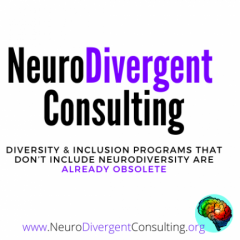Neurodiversity is the idea that neurological differences (Autism, Tourette Syndrome, ADHD, Dyscalculia, Dyspraxia, Dyslexia, and others) are natural variations in the evolution of the human genome.
Neurodiversity seems like the new HR buzzword, and for a good reason. Neurodivergent employees are eagerly entering the workplace, bringing along fresh perspectives and valuable skills.
Employers claim they want to be more inclusive but often fall short when policies and company culture are set up in a way that is can be off-putting for neurodivergent employees.
Are your company policies unintentionally discriminating against autistic and neurodivergent employees?
Open Offices – Collaborative and fun, open offices are a popular option for creative agencies and tech spaces, but these work pits can be overwhelming for those employees who may prefer a calm quiet workspace.
If your workspace utilizes an open office design, try to create spaces for employees to work away from typical office noise and commotion. Provide or allow employees to use noise-canceling headphones while working in open office areas.
Hot-desking – Forcing your employees to stay flexible by keeping them off-guard and always wondering where they are going to sit next. This tactic may not work well, and can even be stressful for, employees who prefer (and often depend on) rituals and routine to stay organized.
If hot-desking is the norm in your office, consider an area with assigned desks for employees in need of more structure.
Bad Lighting (fluorescent bulbs / bright lighting/window glares) – for people with sensory sensitivities bad lightning can be a real problem, leading to symptoms ranging from general discomfort to migraines, anxiety, and even seizures in some individuals.
Allow light sensitive employees seating options that allow them to have better control of their environment. Help your light sensitive employee by replacing, removing, covering, or turning off offending lights. Employees may be helped by substituting overhead lightning for lamps.
Mandatory Fun – Neurodivergent employees may not find the types of activities that neurotypical employees enjoy fun. Happy hours in crowded bars and restaurants can be overwhelming and uncomfortable for people with auditory processing differences.
Don’t make “fun activities” mandatory and avoid statements that might single out introverted employees like, “It’s not mandatory but who wouldn’t want to go to ___________.”
Always give employees the option to easily skip out on office social functions.
Surprise Activities / Last Minute Meetings – Not everyone loves surprises. Respect the needs of your employees who are less spontaneous by announcing activities and sharing details related to team events in advance. The same can be said for last minute meetings.
Overly Formal Dress Codes – I never feel myself when my hair is not a bright and vibrant color, in fact, when my hair is dull I feel very dull myself. Looking around at the faces in the autistic community, many of them have bright, beautiful, eccentric, hair or dressing styles.
Are overly stringent dress codes or any of the above policies keeping (or chasing)neurodivergent workers away from your workforce? Does your company have any of the policies above?
Do you feel your workplace is inclusive? How do you ensure you are supporting and fostering a healthy workplace for all of your employees neurodivergent and neurotypical?

